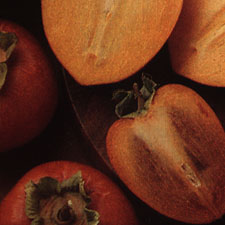
FoodFood InformationFruitTropical
The persimmon, a native of ancient China and Japan and very popular in
the Orient, is a most unusual fruit. Not akin to any other fresh fruit,
it is related to the ebony tree. Just as ebony wood is highly prized for
making furniture, persimmon wood is highly prized for making heads for golf
clubs.
All of our commercially grown persimmons are produced in California because
the fruit of the persimmon trees that grow wild in the Deep South are too
small and fragile to have commercial value. The two varieties grown in California
are the Hachiya and the Fuyu, both of which originated in Japan. Persimmons
have a rather short season; they are in the market from October to January
and a few are brought in from Chile in the spring.
The Hachiya persimmon is one of our most colorful and shapely fruits.
It looks like a shiny, deep-orange-colored, acorn-shaped tomato. If allowed
to ripen fully, there is no fresh fruit that is sweeter than a Hachiya.
However, if it is eaten prior to reaching full ripeness, it is without doubt
our worst-tasting fruit.
When purchasing Hachiyas, select those that are very firm and colorful.
Don't buy those that have started to ripen up because they may be bruised.
Allow the persimmon about three to four days to ripen at room temperature.
When you are convinced that the persimmon is ripe enough to use, wait another
day or two. When you are sure that it is overripe and ready for the garbage
can, then and only then will it be ready to be eaten. By that time the once
beautiful persimmon will have shriveled and lost color. Unless the skin
looks like a blister, it isn't quite ripe. The skin of the persimmon is
similar to that of a tomato. It may or may not be eaten. The edible part
of the fruit is seedless. Serve it as a raw fruit.
Don't ever bite into a firm Hachiya. An unripe persimmon is more astringent
than an equal amount of alum. Even if you drink a gallon of water after
sampling the firm persimmon, it won't wash away the cotton like pucker in
your mouth.
There is an old wives' tale that if you freeze a rock-hard unripe persimmon,
it will be dead ripe when it thaws out. Incredibly, this is true. If you
put a hard Hachiya in the freezer and remove it when it is frozen solid,
it will magically transform and be ripe, juicy, and not astringent when
thawed. Most of the persimmons grown in California are of the Hachiya variety,
but they also grow a limited supply there that are called Fuyus. The
Fuyus aren't nearly as large, pretty, or shapely as the Hachiyas, nor
are they as sweet and juicy when ripe. However, they do have one big advantage:
If eaten while still firm, they are not astringent.

WHEN TO BUY: At peak November and December
WHAT TO LOOK FOR: Firm, colorful fruit
HOW TO STORE: Ripen at room temperature; refrigerate when ready to eat (very
soft to the touch)
Deamer 5/97